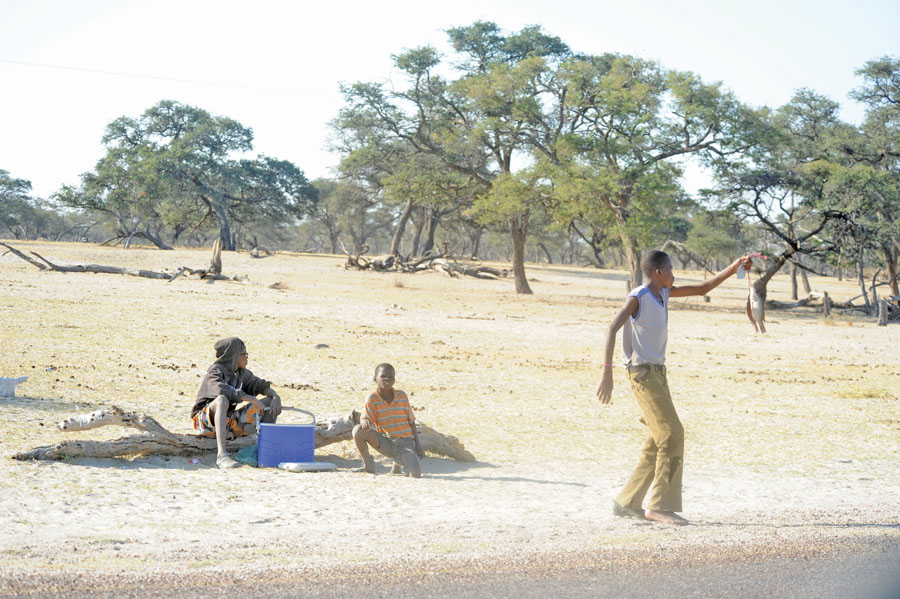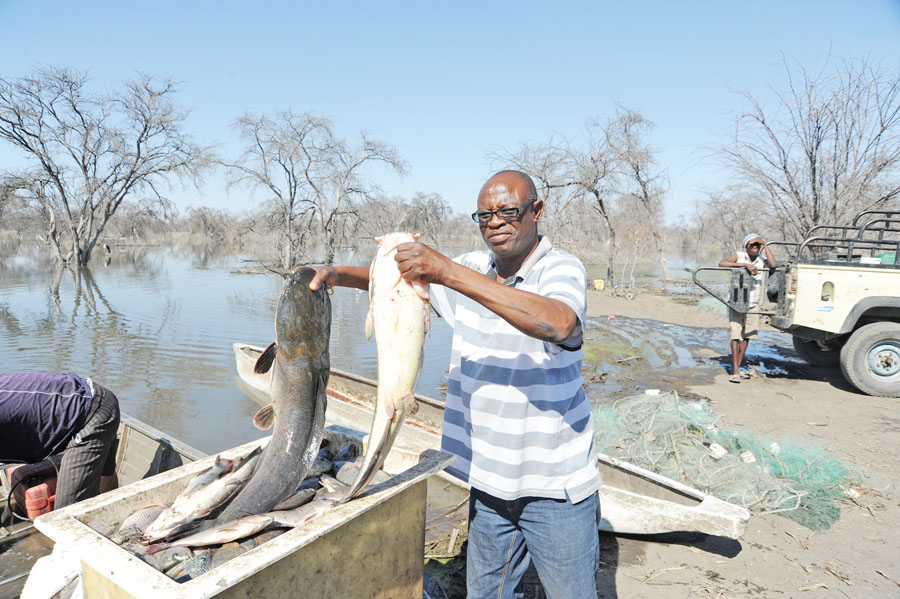Jewel in the Lake
Source : Kutlwano
Author : Calviniah Kgautlhe
Location : SEHITWA
Event : Interview
Five Pula, Five Pula, Five Pula…!” shouts a young boy at the top of his voice dangling a bunch of four palm-sized bream. It is a beautiful and refreshing morning as we drive along the tarred road that stretches from Maun to Sehithwa.
His dusty ears flap as other motorists whizzing past cause the wind to bow heavily across the seemingly barren land while his clothes stick to his tiny body like plastic on a tree. Despite this, he remains rooted to his spot - perhaps to take home an empty cooler box and a fatter wallet.
Having crossed Thamalakane, Kunyere and other rivers using the same Maun/Sehitwa route, it suddenly dawns on me that I am traversing Botswana`s most wet side. With careful observation, one can notice that this road is awash with similar youthful vendors selling fish by the white strapped dusty roadside.
After travelling for about 70 kilometres from Maun and pulling off the main road to the lake, our driver, Adam Mmopi`s driving skills are put to test. Here one requires a very skilled driver given the heavy ankle high dark clay silt that is notorious “clamping” vehicle. Mmopi passed the test and we are suddenly welcomed by the refreshing sight of Lake Ngami.
The soft whistling and warbling of water birds become music to my ears as we enter the edges of the lake which is littered with dead tall trees that once gauntly stood on the silent waters. As if the scene was extracted from a John Baines painting, I am mesmeirised by this wonderful sight.
Sensational! I instantly exclaim with joy, gradually immersing my mind deeper to soak in this rare experience. Consequently, my nose catches a sharp, aquatic smell as a light warm welcoming breeze sweeps across the lake!
This phenomenal creation whose beauty perhaps beats logic is found on the edge of the Kalahari Desert, pinned just on the bosom of Sehithwa village south of Maun. A strong tourism magnet, I think to myself, and it does not come as a surprise that it attracted missionaries such as David Livingstone in the 19th Century.
Livingstone described it as a “shimmering lake, some 130km long and 20km wide” after visiting it in 1849.
Along the lake, there is a huge campsite full of happy people and busy fishermen, big stock birds are freely walking about. Children are merrily playing and running around. One of the fishermen is playing a guitar; some are cooking outdoors or knitting fish nets, de-scaling fish, and selling their catch.
There is also traffic from the mouth of the lake where small canoes are parked ready to traverse the large mass of water while others emerge from the lake full of catch.
Scanning the place further with my sharp journalistic eye while getting closer to the mouth of lake, I notice that most of them are peasant fishermen who primarily use dug-out and fiber glass canoes while a handful own engine powered aluminium boats.
“Aluminium boats are expensive for most of us, government should subsidise them because they are more effective and safer than our conventional ones,” reckons Ngami Fishing Cluster chairperson, Bareetsi Bogaisang.
“These canoes (fibre glass and dug-out) are a risk especially when it is windy and waves are heavy, many lives were lost due to this and we would like government to assist us,” pleads Bogaisang, his eyes fixed on his hands that he keeps on rubbing together.
Furthermore, says Bogaisang, this plea to government can only work if licensed fishermen are more organised and active in growing the fisheries sector. “We must be more organised rona ba re nang le dilisense gore re tle re laole mmaraka wa rona wa ditlhapi sentle go lese go nna indoda le indoda ya iphandlela, selo se ke sone se se re direlang mathata.”
This means that if they can work together as fishermen and secure good markets they can sell collectively and ensure consistent supply especially to chain stores.
He reckons that although they also sell fish to customers as far as Zambia and Namibia, the market is still unreliable due to various factors.
Sub Okavango Fisheries Association chairperson, Nonofo Galebotse, says he started fishing in 1978 adding, “although Lake Ngami is much safer compared to the Okavango Delta because there are no crocodiles, it has more challenges because it is not always calm. When it is ‘angry` because of big waves it stops us from entering its waters for about two to three days.”
“In short, fishing expenses are high at Lake Ngami,” says Galebotse.
What are you doing to solve your problems and how would you like government to assist you? I ask.
“We are fishermen and this is our life. We have no resources but we are trying, finding markets is a serious challenge. We would like government to help us with find markets.
A lot of experts from abroad have met with us on several occasions but to date we still have not seen the results,” pleads the fisherman.
The question remains, for how long will the young men remain screaming five Pula by the roadside in a tourism hub boasting a fully-fledged aquaculture industry capable of diversifying Botswana`s economy? Ends
Teaser:
“If we can work together as fishermen and secure good markets we can sell collectively as well as ensure consistent supply especially to big chain stores.”














